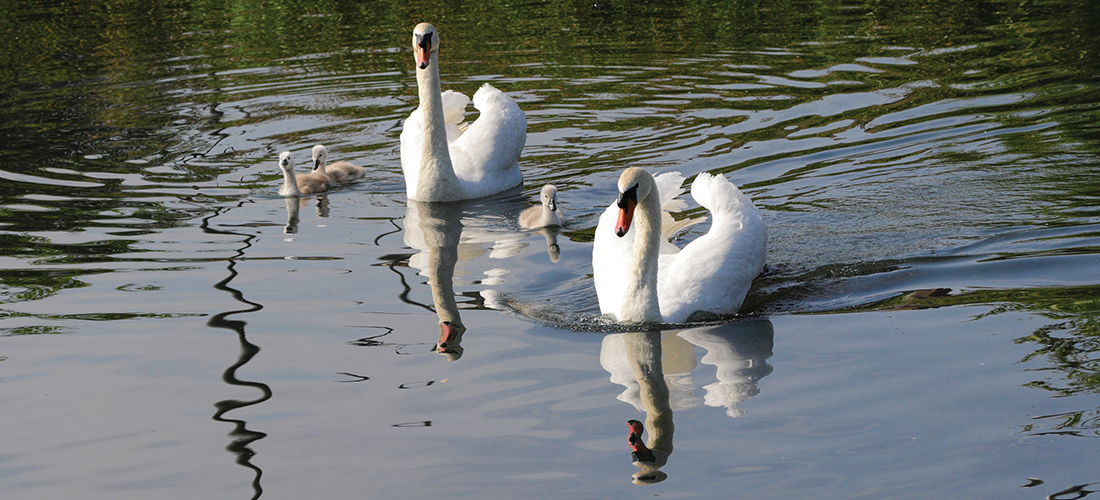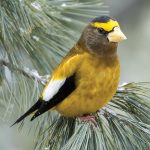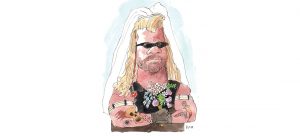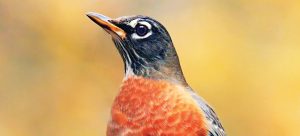
Swan Lakes
A torrid romance for the bird-brained
By Maria Johnson
Hamilton and Euphemia were happy.
Until Rhett showed up.
How can there not be trouble when a Rhett shows up?
They all lived together for about a month. Everyone got along swimmingly, until . . . lust and jealousy busted out.
“I cannot tell you the violence,” says John Atkinson, a neighbor who witnessed the chaos first hand.
Hamilton and Rhett brawled out in the open. They pummeled each other. They tried to drown each other. They tangled so fiercely that another neighbor called Atkinson to say the brutal displays were upsetting her daughter. Couldn’t Atkinson do something?
He intervened. He helped Rhett to find a new place, a few streets over. Rhett was alone until . . . he found another lady. Her name was Scarlett.
C’mon. You knew it was coming.
At this point, I should probably tell you that the main actors in this drama — except for Atkinson — are swans. Specifically, they’re the swans of Hamilton Lakes, the woodsy west-Greensboro neighborhood that mushroomed in the 1950s and ‘60s.
At some point, someone decided that a pair of mute swans — so named because they’re relatively quiet compared to their louder cousins — would be a fine addition to the lakes. Mail-order swans and their offspring came and went, thanks mostly to foxes and snapping turtles. Various neighbors kept tabs on the long-necked birds. Eventually, the baton passed to Atkinson and his wife, Lee, who moved into the neighborhood in the late ’80s.
It made sense. The Atkinsons live right next to Lake Euphemia and the Jim King Pond, so they have a front-row seat for the swan drama. Plus John, a former bird hunter, has an enduring love of nature.
“God has created an unbelievable universe,” he says quietly.
He dived deeply into the swan life about six years ago, when a pair on Lake Euphemia hatched five cygnets. Fearing that snapping turtles would gobble the babies, John gathered up the chicks and took them to his house.
“I put them in the basement and made them a cardboard house, and put a light in there for them, and figured out what to feed them,” he says.
John exercised them in the vacant dog runs behind his house. He let them swim in the koi pond. One of the cygnets died. When the four survivors were big enough to fend for themselves, John installed them in the Jim King Pond. The biggest male, a.k.a. Big Boy, and the biggest female paired off and harassed the other two swans — John assumed both were females — to no end.
So John transplanted the two outliers to Lake Euphemia, where the sisters lived alone until . . . one of them turned out to be a male, which explained the territorial squabbles.
The expats became Mr. Hamilton and Miss Euphemia, and the two swan couples lived side-by-side in the adjoining waters for years. Until . . . Big Boy’s mate died, leaving him alone on the Jim King Pond.
One day, a couple of months ago, Lee Atkinson announced that three swans were on the pond.
“What the hell?’ said John.
Sure enough, Hamilton and Euphemia had returned, looking for revenge from the days when they were bullied.
Hamilton and Big Boy rumbled.
Hamilton won and claimed the pond. Later, he smacked down Rhett, a rescue who evacuated over to Lake Hamilton to live with Scarlett. Incidentally, Scarlett was found dead not long ago. There are whispers of a vixen in the shadows. So, Rhett is alone again, but friends are trying to hook him up.
Meanwhile, Big Boy lives the bachelor life on Lake Euphemia. Everybody has heard that swans mate for life, and as far as John can tell, that’s true.
Once paired, they remain coupled. They swim side by side. If they’re separated, they call to each other with lonely coos.
If one of their babies dies, they mourn.
If a competitor shows up, especially during mating season, they fight bitterly.
Courtship is elegant, often involving intertwining like dancers in a Tchaikovsky ballet.
It’s hard not to project human emotions onto their behavior. John reminds himself that they’re not people, and yet — he feels for Big Boy. He has heard that widowed swans will accept a new mate. He knows a man Down East who sells mute swans, and he’s thinking of ordering a female.
He goes outside, scoops chicken feed into a bucket and walks to the edge of Lake Euphemia. Big Boy watches from a bank 20 yards away.
John approaches slowly, talking in soft tones.
Big Boy lumbers to the base of a tree and settles on a pad of grass and pine needles. He picks gently around the edges.
To Atkinson, the mound looks like the beginning of a nest.
Spring is almost here. OH
Maria Johnson is a contributing editor of O.Henry magazine. Contact her at ohenrymaria@gmail.com.





